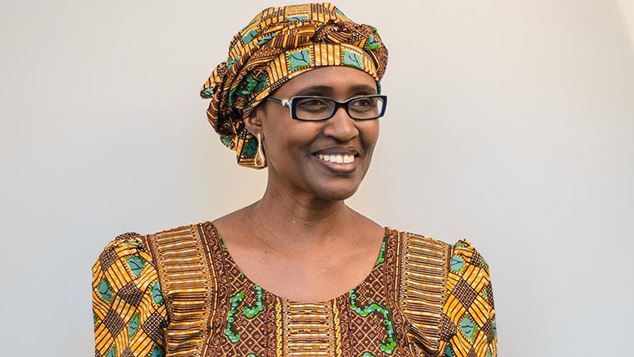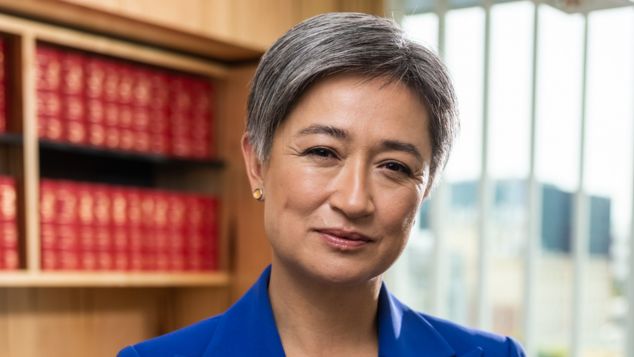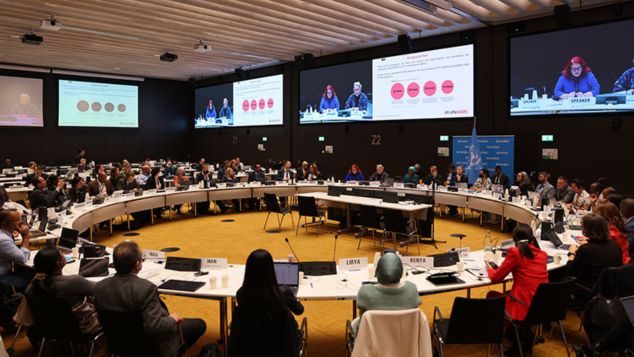
The 53rd meeting of UNAIDS’ Programme Coordinating Board (PCB) came to a close in Geneva, Switzerland last week, with board members making strong commitments to redouble efforts to end AIDS by 2030.
In her remarks to the Board the Executive Director of UNAIDS Winnie Byanyima (pictured) said there will still a lot of work to be done.
“I wish I could tell you now was the time to relax, but we are not done yet. And pulling back before we are done—that is how pandemics resurge; how the least powerful get left behind; how the virus thrives. In a pandemic, there is no standing still. If we do not make progress, the virus will.” Byanyima said.
This PCB meeting took place at a critical time for the response to HIV, midway through the Global AIDS Strategy 2021-2026 as UNAIDS is redoubling its focus on achieving the 2025 targets.
The First Lady of Namibia, Monica Geingos, delivered the keynote address at the gathering warning against complacency.
“Partial success in the AIDS response coupled with emerging pandemics has given rise to complacency that must be reversed. Fresh thinking and approaches are urgently required to reach the 2025 targets and to achieve the goal of ending the pandemic by 2030.”
Addressing the shortfalls in global funding for HIV and for UNAIDS, Byanyima urged donors to front-load resources, support developing countries to grow their fiscal space, and to fully fund UNAIDS with multi-year funding.
UNAIDS currently has a shortfall of US$ 50 million in their budget, which will make their task more difficult. In 2022, US$ 20.8 billion was available for the global response to HIV, far short of the US$ 29.3 billion needed by 2025.
“We remain deeply concerned about the current funding situation of the Joint Programme and the expected impact on different strategic result areas. We are encouraging all PCB member states and observers to seek ways to augment their support to the Joint Programme in 2024,” said Binod Mahanty, Health Adviser, Federal Ministry of Health of Germany.
Several donors have recently increased their core contributions to UNAIDS, including Côte d’Ivoire, the Netherlands and the United States.
During the meeting France announced a 50% increase in its voluntary contribution to UNAIDS, Germany announced an additional 1 million Euros, and Luxembourg announced an additional 100 000 Euros for UNAIDS.
Australia has recently pledged up to $12 million to help end HIV-AIDS in the Asia Pacific region
Australia has also been leading the way with a recently announced investment of up to AUD$12 million for a new partnership with UNAIDS to let communities lead in ending AIDS in the Asia Pacific region.
Australia will work with the Joint United Nations Programme on HIV/AIDS (UNAIDS) and Health Equity Matters to deliver this new initiative, which aims to accelerate access to new HIV prevention and treatment solutions, through community-led responses.
When Foregin Minister Penny Wong announced the fnding on World AIDS Day it was highlighted that HIV responses which are specifically crafted for and implemented by communities, are key to addressing stigma and discrimination, and reaching all those who need help.
“Globally we have made remarkable progress in the fight against HIV – but there is still more to be done.
“It is critical that Australia supports communities in our region to end the HIV epidemic, including through sharing our own knowledge and experience.” Minister Wong said.
Testing is the key to progress
A thematic segment on HIV testing was held on the last day of the PCB. Board members discussed how HIV testing services are the gateway to HIV prevention, treatment, care and other support services.
The Keynote speaker for the HIV testing segment was Professor Kevin Fenton CBE, Public Health England.
He said, “In our efforts to end HIV transmission by 2030, we must let communities lead in redoubling our efforts to deliver what we know works – HIV prevention, testing, PrEP and HIV treatment – at scale. And we must work to end HIV stigma, which prevents so many from living their authentic life, full of compassion, free of fear and able to contribute fully to society.”
Winnie Byanyima told the gathering that she still believed that ending AIDS was still possible, but it needed a multi-pronged approach.
“Ending AIDS is possible but only if we take bold action to revolutionize HIV prevention, scale-up testing, fight stigma, discrimination and inequalities, reach young women and girls and key populations with HIV services, remove harmful laws, increase resources and strengthen the multisectoral approach,” Byanyima said.
The meeting was the 53rd time the PCB have come together, and it was chaired by Germany, with Kenya serving as the Vice-Chair and Brazil as Rapporteur. The 54th meeting to be held in June 2024. It will be chaired by Kenya, with Brazil serving as Vice-Chair and the Netherlands as Rapporteur.
OIP Staff
You can support our work by subscribing to our Patreon
or contributing to our GoFundMe campaign.








